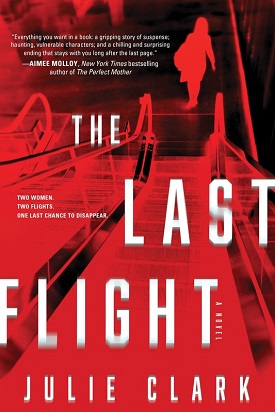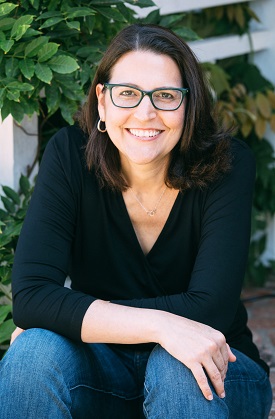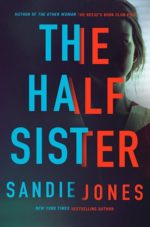 Synopsis:
Synopsis:
Two women. Two flights. One last chance to disappear.
Claire Cook’s husband is ambitious, admired, and from a powerful and influential family with deep pockets. Behind closed doors, he has has a temper that burns as bright as his promising political career. He uses his staff to track Claire’s every move.
He doesn’t know that Claire has spent months putting together a plan and resources. She is about to vanish.
A chance meeting in a bar at JFK airport connects her with Eva James, a woman who is equally desperate to flee her life. They make a last-minute decision to switch tickets, with Claire taking Eva’s flight to Oakland, and Eva traveling to Puerto Rico as Claire. But the plane bound for Puerto Rico crashes, leaving Claire with one impossible option: assume Eva’s identity, and guard the secrets Eva fought so hard to keep hidden.
With your back against a wall, would you be brave enough to take the chance you’re given?
Review:

Author Julie Clark always wanted to be a writer, and was encouraged by professors at the University of California, Berkeley, where, as an employee in the athletic department, she was able to take courses free of charge. She didn’t begin writing in earnest until her children were old enough to sleep through the night, and landed a publishing contract with the second novel she drafted, The Ones We Choose. These days, she rises at 3:45 a.m. and writes until 6:00 to 7:00 a.m. while she continues raising her two sons and teaching fifth grade.
Clark describes The Last Flight as a story about two women, both of whom have been victimized by men under different circumstances and in different settings. But they have ended up in the same place. Each is seeking to run away from her past and start over. The author was fascinated by the idea that someone could actually drop out of their life, and pondered how they might accomplish it. She says she actively considered what things they would need, how they would get them, where they would go, and how they would live once they arrived there, as well as “what they’d have to be leaving behind.” She knew her main character had to be a woman with “an inner strength, even if her current situation didn’t allow her to use it.”
If you pay attention, solutions always appear. But you have to be brave enough to see them.
Thus, Claire Cook came to be. She and Eva connect in the bar at JFK airport. It is ostensibly a random meeting. Claire has planned and plotted for some time to escape her powerful, abusive husband, Rory. She was supposed to fly to Detroit to make an appearance, but Rory is posed to announce his candidacy for the Senate in one week and, at the last minute, it is decided that he will go to Detroit and Claire is dispatched to Puerto Rice. Because of his money and influence, and past experience, Claire has concluded that disappearing without a trace is truly the only way she can escape Rory’s reach. When Eva approaches Claire in the airport bar, Claire is panicked because the plan she has meticulously devised has been foiled and she doesn’t know what to do, lamenting, “All my plans, vanished in the few hours I slept. Everything I’d assembled, the forty thousand dollars, the fake ID from Nico, my letter, and all of Petra’s help. Waiting in Detroit, where Rory will open the package and know.”
Eva was raised in foster homes and a San Francisco orphanage before enrolling at the University of California, Berkeley. She loved the school and her studies, but due to events that transpired while she was a student, she did not graduate. She has continued residing in Berkeley, working as a waitress, but is on the run from persons and events that, like Claire, she knows she cannot escape without disappearing in a manner that ensures she can never be found.
The premise of The Last Flight hinges upon Claire and Eva agreeing to trade boarding passes, clothing, handbags, wallets, and telephones after getting through security. And then boarding each other’s flights. Claire follows through, but finds herself in Berkeley without money, new identification, or other resources. She proceeds to Eva’s apartment, planning to hunker down there until she figures out her next move. She adopts Eva’s identity but is stunned when she sees news reports and learns that the plane she was supposed to board crashed into the sea. Early reports indicate there are no survivors so Rory believes, like everyone else, that she is dead. Claire knows that means that in the minds of everyone she has ever known, she is “no longer walking among the living. And yes, I still get to carry everything that belonged to me. My joys, my heartaches, memories of people I loved. And I feel a sense of privilege I don’t deserve. That I get to keep it all and Eva does not.” Yet Claire quickly realizes that, for her, the crash offers “not just a head start,” but “a new start” and details she observes in the news footage cause her to question whether Eva actually boarded the plane. Claire suspects she may still be alive, and wonders about her whereabouts.
The Last Flight is a thoroughly engrossing story about two women who, at first glance, appear to have nothing at all in common. But Clark reveals that they are actually very much alike. Each is strong, resilient, and determined to escape a dangerous, desperate predicament in order to start a new life over. Each woman has been oppressed by different forces and events, but the result is the same. Both are driven to risk everything for a second chance. In Claire’s case, the #MeToo movement has done nothing to make her circumstances less fraught with danger. And Eva has made very bad choices and done abhorrent things in order to survive. But she wants to put that behind her, and get away from the people who are fully invested in seeing to it that she furthers the enterprise and keeps her mouth shut. If she fails to cooperate, they will silence her. And they begin bearing down on Claire once they realize that she is residing in Eva’s home. Claire begins to piece together clues Eva left behind about her life, activities, and associates. She realizes that Eva was involved with people who will use any means to continue their endeavor and by stepping into Eva’s life and using her identity, she has placed herself in a new kind of danger. In the chapters devoted to Eva, Clark gradually reveals the forces that derailed her dreams and the things Eva did to survive, as well as why she ultimately concluded that it was time to disappear.
Clark employs alternating narratives. Claire relates her experiences and feelings in a first-person narrative. Clark notes that she first wrote Claire’s story as a singular narrative, devising the character of Eva out of necessity — Claire needed an accessory to facilitate her disappearance. Eva’s tale is told in the third-person. Both techniques are extremely effective. Clark pulls her readers into the women’s lives at the outset and their tension-filled adventures unfold at an absorbing and unrelenting pace.
Everything you ever wanted is on the other side of fear.
Each woman is flawed, but likable and empathetic. Some readers will find Claire exasperating, lamenting that she has been weak for too long and should have left Rory sooner. However, as Clark injects details about the past, including the way the loss of her mother and sister in a horrific accident effected her, Claire’s beliefs and reasoning become apparent and plausible. Claire observes, “This is the price of abuse. It has twisted my thinking into such a tangle I can’t tell what’s real and what’s not. . . . Years of being under Rory’s influence has made it so that I’ve given him nearly superhuman power.” Likewise, Eva, as noted, has made terrible choices but she felt that she had no other options after she was repeatedly abandoned and sold out. “Eva knew what it was like to almost have something within her grasp, only to have it yanked away again. It made you desperate, a hunger so fierce it blinded you to all the ways it might go wrong.” She gradually comes to believe in her own self-worth and develops the strength to extricate herself from her situation, in part because of her friendship with her next-door neighbor, a visiting professor who refuses to judge her, and unconditionally accepts and supports her. Most importantly, Eve learns that all of her choices “had consequences. It was what you did with those consequences that mattered.”
The book’s pace accelerates with shocking revelations and plot developments. The resolutions Clark gives her characters’ stories are quite different. One is credible and satisfying, the other shocking and controversial. For that reason, along with the thought-provoking themes Clark explores, The Last Flight is an excellent choice for book clubs, providing plenty of topics for discussion.
Regardless of the surprising ending, The Last Flight is one of 2020’s best thrillers. It is entertaining, touching and poignant, featuring characters whose stories resonate long after the contentious ending is revealed.





Comments are closed.